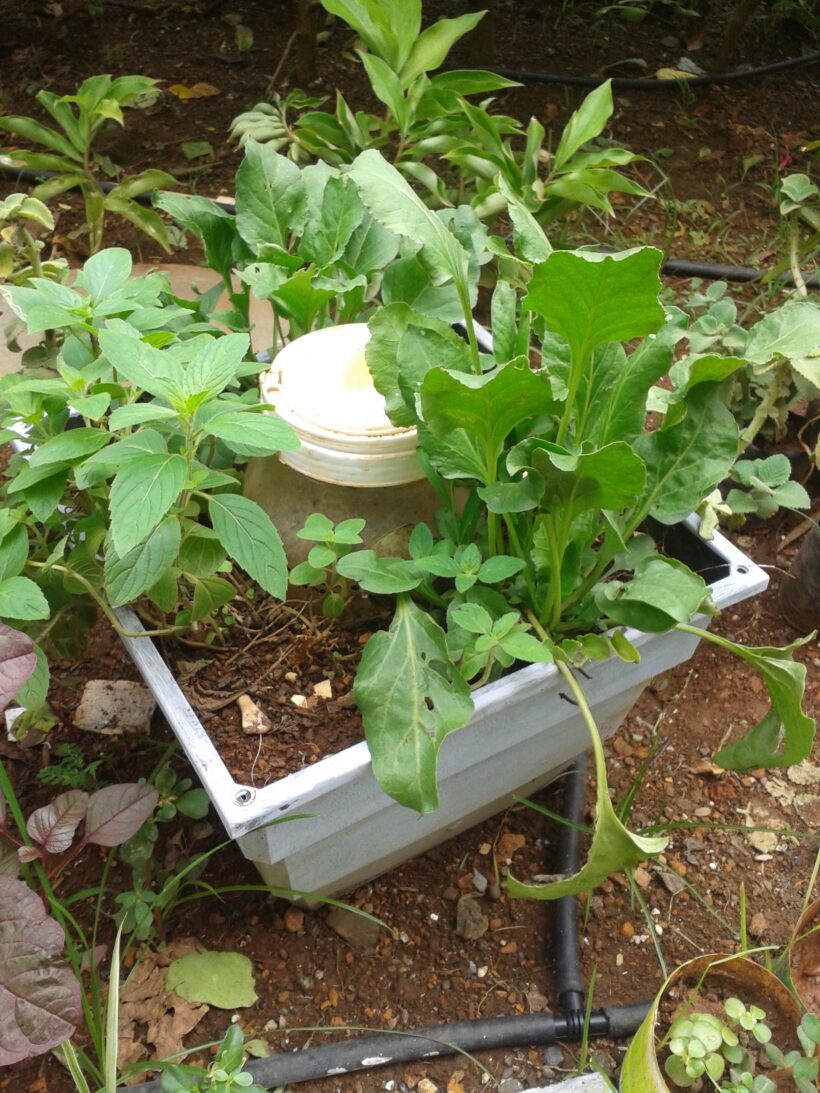An Organic garden is easy to start. You have everything you need at your home.
Food waste and a Mud Pot – Its that easy!
All types of food waste can be composted, cooked and raw, veg and non veg. However if your composting at home for the 1st time I would recommend try composting with just veg food raw or cooked. When the food waste is small it composts faster. So you may want to run your waste in a mixer and then add it into your composting pot. Preferably, cover every layer of food waste with a layer of mud. You assist the composting process, when you stir the contents. In fact aeration is the key to aerobic composting. Stir your contents atleast twice a day. It is important to ensure that your contents are moist but not soggy . Typically composting process gets completed in a period of 20-25 days.
There is no smell and the waste looks like black earth. Refer to our video on home composters that you can make. https://www.youtube.com/watch?v=BFqo_ha6nS4
Since the last few years of working with vegetables and compost I have understood why compost is called “black gold” . When we eat healthy we feel healthy and our body also responds accordingly.
The same is the case with plants. When we give them a nutritious mixture of compost they produce healthy vegetables that have absorbed the nutrition from the compost. In fact over a period of time say 3 to 5 years your soil becomes so good that your crop or vegetables keeps giving you a bumper harvest.
Now think what happens when plants are grown with chemical fertilizers and pesticides, The same gets imbibed into the fibre and our food. No amount of washing can take away. Besides this, over a period of time the soil becomes really poor which means more fertilizers are required, as the good active bacteria in the soil have been destroyed.
Let me give you an example its been seven years since I started composting at home. I have a small window garden like most Mumbaikars. Since I heard growing tomatoes was very easy I tried my hand at it. Every time the plant grew nice and tall. I kept it in an 8 inch pot, ensured it got good sunlight and waited patiently. Flowers came and went but we did not get any tomatoes. Thereafter I started my experiments with compost. I tried various methods made units from scratch to figure the best system that involved the least amount of work .
While working I would add all my compost results in my pots and to my surprise I had 3 tomatoes growing randomly in my 6” pipe planter, (that’s considered small for fruiting plants). This time not only did the tomato plants grow well but we also harvested a dozen cherry tomatoes as the pot was small. My kids are I were thrilled.
What I learnt is that tomato seeds don’t compost that’s how they randomly sprouted in my pot. My soil was rich in microbes thanks to the compost we regularly added. Our soil was now self feeding and providing the delicious tomatoes. You take care of nature and nature takes care of you.
Now when it comes to societies having 5-20 flats producing 5-20 kgs of waste a simple and easy to use system is the twin tumbler with built in aeration pipes. I have used these systems with my schools too and have 5th to 8th grade students using the tumblers to turn food waste into compos
I like to use these units for my schools as the children actually see the chemical changes that turn their food waste into compost. So what does not go in? Tender coconut shells they are simply too big and though they will compost they take a long time. Now along with the food waste (nitrogen) you need to add a carbon component that’s sawdust, shredded leaves or shredded paper. In a 1:2 ratio the contents must be moist but not soggy to ensure effective composting. The trick to composting is in the aeration, so rotate the units daily and slowly. On tumbling slowly the waste inside gets a chance to fall inside the drum. It uses its own weight to crush or break down the particle size. The slow tumble also helps in effective aeration of the contents.
Efeective aeration ensures no foul smell.
During the composting proces, compost tea is released and it collects in a tub below the unit. This tea is useful as it’s a mixture of various water soluable minerals and acids that come from our food. Simply mix this tea in a1:10 ratio with water and use in your garden.
Compost usually takes about 20-25 days to compost and mature well. When its freshly taken out of the drum allow it to dry for 3-4 days in the sun before using it on your plants. Another word of caution – compost is strong multivitami. Use it sparingly on plants or they may burn. A plant about 12inch high needs only 1 tables spoon of compost every two weeks. Get going with your organic garden and please contact us for any help.


